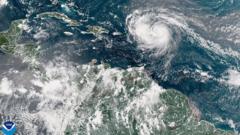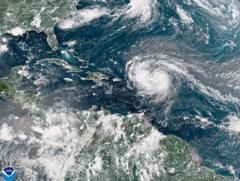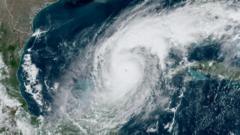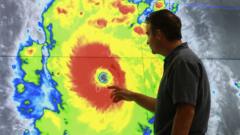In response to earlier plans to suspend vital satellite data for hurricane forecasting, the Department of Defense has announced a one-month extension of its availability, citing cybersecurity risks. Experts warn that more extended access is still necessary to effectively manage hurricane season forecasts.
Temporary Reversal on Satellite Data Cancellation Offers Breathing Room for Hurricane Forecasts

Temporary Reversal on Satellite Data Cancellation Offers Breathing Room for Hurricane Forecasts
U.S. officials announce a one-month extension for critical satellite data vital for hurricane monitoring, addressing concerns over forecasting quality.
In a surprising turn of events, the Department of Defense (DoD) has announced a temporary reprieve regarding its decision to cut off access to critical satellite data essential for hurricane monitoring. This data will now be available to meteorologists and climate scientists until July 31, 2025, rather than the previously scheduled termination date of June 30. The announcement aims to address growing concerns over the quality of hurricane forecasts that rely heavily on this data.
Earlier, the National Oceanic and Atmospheric Administration (NOAA) indicated that the data from three satellites, operated jointly with the DoD, would soon be withdrawn due to “recent service changes.” The only elaboration given was a cited “significant cybersecurity risk.” Under pressure from scientific communities, notably after a request from a NASA scientist, the extension was granted.
The original discontinuation plan drew immediate backlash from meteorologists and climate experts, who feared a dramatic hit to the precision of hurricane forecasts, thus escalating risks to lives and property in coastal areas. Michael Lowry, a seasoned hurricane specialist with experience at the National Hurricane Center, expressed concerns, noting that this temporary solution only pushes the issue a month down the road, yet it fails to extend through the crucial peak months of August, September, and October when hurricane activity typically escalates.
The implications of the DoD's decision extend beyond hurricane forecasting. Researchers studying climate patterns, specifically those focusing on sea ice changes in the Arctic and Antarctic regions, depend on this data for their long-term studies. Sharon Stammerjohn, a senior research associate at the University of Colorado Boulder, emphasized the importance of this data for understanding global climate shifts, particularly in relation to the critical seasonal fluctuations of sea ice.
While alternative satellite services may partially compensate for the data loss, discrepancies in sensor calibration and data resolution present significant challenges that could hinder the reliability of findings from these other agencies.
This unexpected turnaround raises questions about the internal communications within government agencies and highlights the urgency of maintaining consistent access to scientific data during periods of climatic extremes.





















